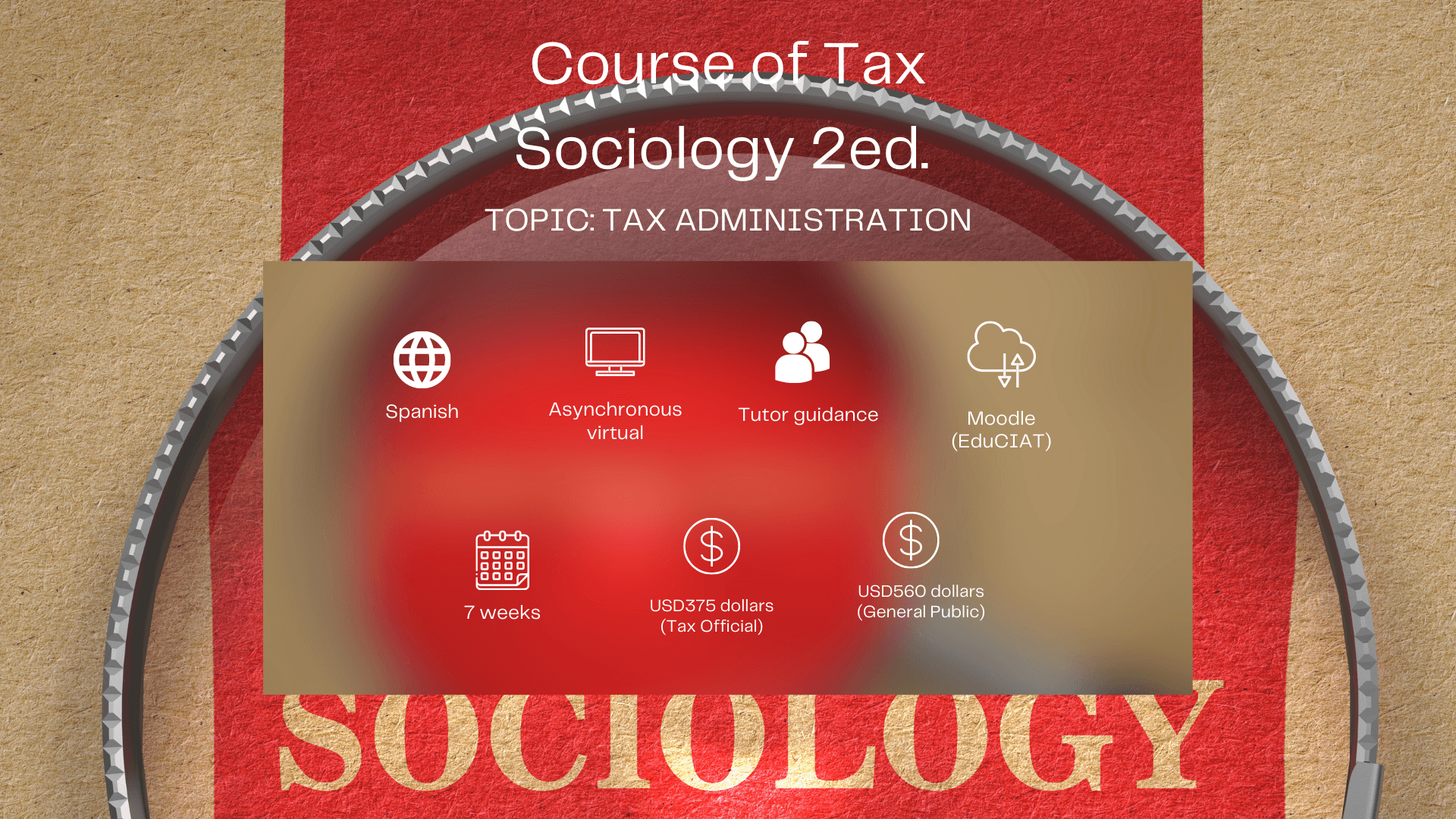
General Information
About the course
This course seeks to identify and understand the scope of work of fiscal sociology and its impact on the management of public revenue and expenditure. Knowing the main characteristics of the tax culture of a given country, framing them in a context of a certain level of tax compliance or fraud and identifying its causes and consequences. To know the main methodologies for measuring taxpayer opinion, including the interpretation of results. To learn how the results obtained can help the authorities to make decisions in the tax field. The following topics will be developed during the course:
- Introduction to Tax Sociology
- The tax culture of citizens
- Tax fraud: causes and social measures to combat it.
Target audience
Medium high and / or high-level officials from the Ministry of Finance, with capacity for decision-making, responsible for the design of tax policies, their strategic implementation and carrying out technical and analytic studies. Officials with the above mentioned profile, who work in the areas of the Finance Ministry budget, public market analysis, treasury, innovation of the public finances, government accounting, tax relations, fiscal policy, among others, are invited to participate
Certification
The Training Coordination issues academic certificates of approval in digital format, which requires that participants have obtained the minimum passing grade of the course.
Registration Deadline
August 13, 2023
When
September 11, to October 29, 2023.
Frequently Asked Questions
What are the technical requirements for the CIAT courses?
The participants will need the following tools:
- Internet connection.
- Updated browser (Google Chrome, Mozilla Firefox or Safari).
- Permissions to receive external e-mails.
- Adobe Reader.
- Java.
- Zoom, the tool for synchronous sessions.
How many hours should I dedicate to the course?
For the individual activities, you should dedicate at least one hour a day to review and complete the material. In the case of collaborative work, it varies from one to two hours for the correct development of the work that you have to do, together with your classmates. Generally, we calculate a weekly dedication of 12 to 15 hours. In general, the activities have a closing date on Sundays at 23:55 hours in Panama.
What is a virtual classroom?
The virtual classroom is the space where you will find the study materials, homework, discussion forums, exams and complementary material; in addition, you communicate with the tutor and classmates takes through the option of messages and communication forums. Through these means, you have the possibility to ask questions, resolve your concerns and academic doubts. The tutor will be present throughout your learning and teaching process.
In case of problems, who should I contact?
In order to better assist you and answer your questions, please contact the following:
- For computer assistance: César Trejos (ctrejos@ciat.org) and Maureen Perez (mperez@ciat.org)
- For administrative assistance: Mónica Donoso (mdonoso@ciat.org) and Maureen Perez (mperez@ciat.org)
- For academic assistance: Your tutor (through the platform).
The virtual classroom is equipped with several communication tools to share ideas and information.
What are the steps to withdraw from the course?
Within the first 10 days students must write a message to the Tutor with copy to the Administration with their intention to postpone it; demonstrating that it is due to justified situations of force majeure. The withdrawn student will be entitled to the amount of the payment made and may use it to enroll in the next edition of the training program. He or she will start again from the first lesson.

Alejandro Juarez
ajuarez@ciat.org
Maureen Pérez Álvarez
mperez@ciat.org
César Trejos Canto
ctrejos@ciat.org
Mónica Donoso
mdonoso@ciat.org
More about CIAT
-
CIAT participated in the “Caribbean Tax Outreach 2026”
-
TADAT: the diagnosis every tax administration needs
-
María Fernanda Inza
-
Artificial Intelligence Agents in the control of Transfer Pricing
-
Ignacio Granado Fernández de la Pradilla
-
Mario Pires
-
Revenue Report CIAT (RRC). First Semester – year 2025
-
Fernando Raúl Martín
-
CIAT and SEFAZ-AL Strengthen Tax Modernization in Brazil with the Advancement of the SATI Project
-
Artificial Intelligence and Taxpayers’ Rights: regulatory consolidation in the Province of Córdoba
